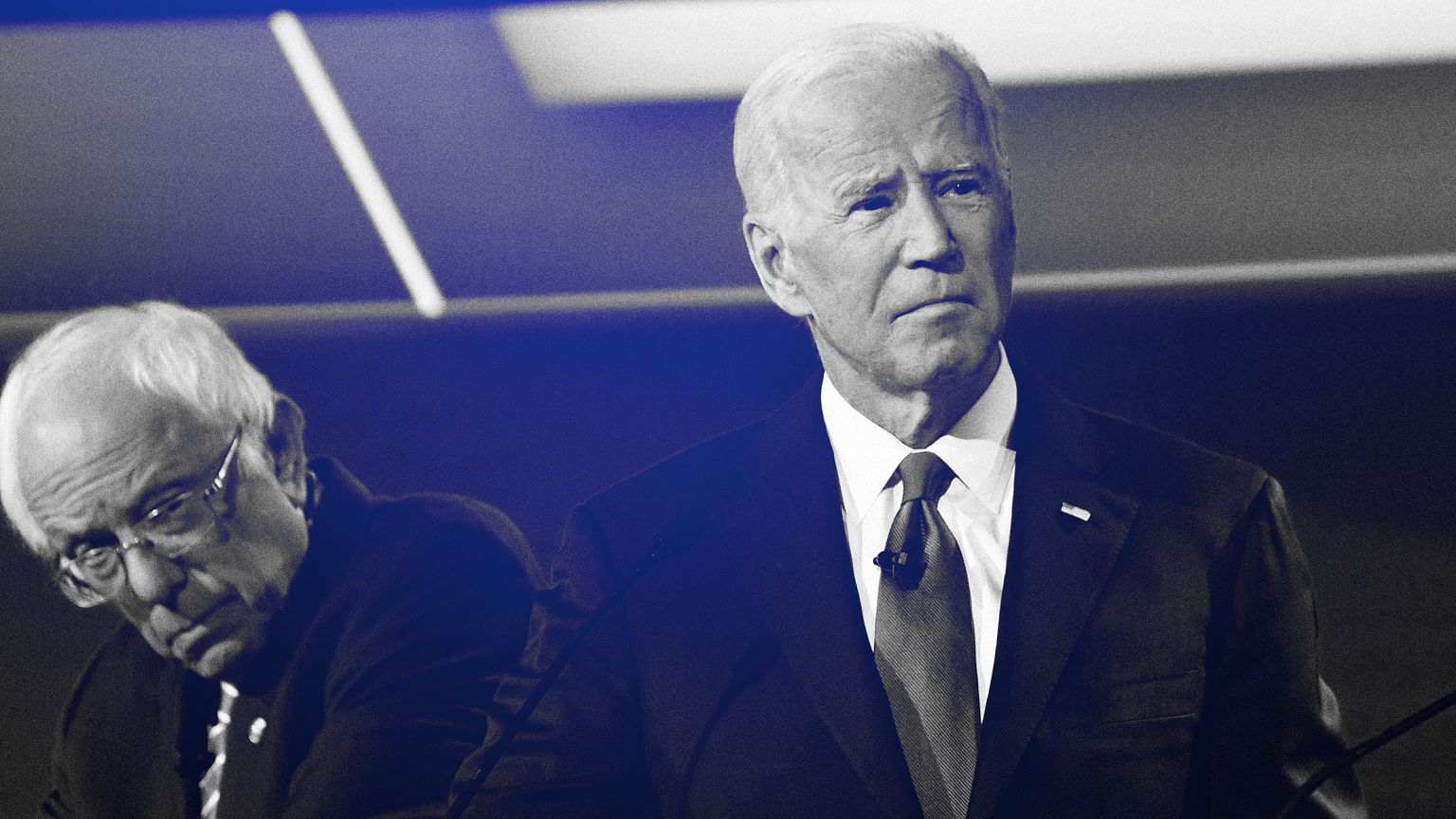Results from the voting in 14 states and NBC exit polls reveal a lot about the state of Democratic race to take on Trump.
WASHINGTON — It was the biggest night of Joe Biden's half-century in politics. Bernie Sanders fell short but notched up some valuable victories to make it a two-person race. Elizabeth Warren lost her home state and Mike Bloomberg went bust on a half-a-billion dollar bet.
The South Carolina victory, the consolidation of moderate rivals and even the fear of coronavirus propelled the former vice president to victories in a majority of the 14 states that voted Tuesday, from New England to the South to the Midwest. He won Virginia, North Carolina, Massachusetts, Tennessee, Oklahoma, Alabama Arkansas, Minnesota and Texas.
Sanders won Colorado, Utah and Vermont. Maine and California were still too close to call.
As of Wednesday morning, Biden led with 453 delegates, while Sanders had 373; Warren was miles behind with 39 and Bloomberg had 18, according to NBC News projections.
Here are seven takeaways from a big day of voting:
1. The party's proxy war
The Democratic establishment fought back by consolidating against Sanders, and it paid off. Yet the party divisions linger — while older voters and moderates embrace the comfort and familiarity of Biden, younger and progressive voters are still clamoring for a different kind of leader like Sanders; while black voters prefer the former vice president, Latinos have embraced the Vermont senator.
Now it's up to Democrats going forward to decide which vision they prefer — a moderate candidate promising to heal a divided nation, or a populist progressive vowing to make the economic system fairer for workers.
The emerging one-on-one contest is becoming a proxy war for whether Democratic voters want a unifier or a change agent. NBC News exit polls showed that Biden voters said by 2 to 1 that they prioritize a candidate who "can unite the country" while Sanders voters said by a similar ratio that they preferred someone who "can bring about needed change."
"We are not only taking on the corporate establishment, we're taking on the political establishment," Sanders told supporters Tuesday night in Vermont. "You cannot beat Trump win the same old, same old kind of politics."
2. Sanders warning signs
Aside from Biden, Sanders was the only candidate on track to pick up delegates in all Super Tuesday states, ensuring he remains a strong contender through the rest of the primary season.
The Biden wave didn't make it west of Texas. In California, NBC News exit polls showed Sanders leading in the biggest delegate prize on the map. He was winning 54 percent of voters under age 45, 49 percent of Latinos, 41 percent of liberals and 44 percent percent of independent-leaning voters. He led all candidates among men, women, white and non-white voters.
Yet there are warning signs for the Vermont senator who entered the day as the frontrunner. He continues to show strength among young people, but isn't producing the turnout boom among millennials and Gen Z voters that Sanders, and many experts, say is necessary if he's to seize the nomination.
Sanders lost Oklahoma after winning the state by 10 points in his unsuccessful 2016 campaign. Losing Minnesota, which he also won last time, may be a bad sign for neighboring industrial Midwestern states Sanders also won four years ago — Wisconsin, Michigan and Indiana — and which just became more vital for him. (But there's a caveat in Minnesota — the contest came one day after popular home-state senator Klobuchar dropped out and threw her support to Biden.)
3. Biden is back — with a vengeance
Biden has gone from being a dominant frontrunner to a candidate on the brink of collapse and back to front-runner. What happened?
"You look like a giant killer in South Carolina, you project that electability strength," Robert Gibbs, a former spokesman for President Barack Obama, said on MSNBC.
Late-deciders powered Biden on Super Tuesday, an indication that the endorsements one day earlier from former rivals Pete Buttigieg, Amy Klobuchar and Beto O'Rourke helped. A total of 29 percent of Super Tuesday Democratic voters decided in the last few days and 47 percent voted for Biden, more than twice that of his nearest rival Sanders, according to NBC News exit polls.
The coronavirus outbreak also boosted the former VP — among voters who said it was an important factor, 47 percent backed him, while 29 percent favored Sanders.
4. Southern strength
Biden's dominant performance with black voters in South Carolina on Saturday was echoed in nearby North Carolina and Virginia on Super Tuesday, and fueled his victories across the South.
So far, Sanders has barely, if at all, improved on his 2016 performance with African Americans in Southern states. But it remains to be seen if that will translate in other parts of the country. NBC News exit polls found that Biden won 62 percent of black voters in the South and 33 percent of black voters in other states. Most of the contests in the next two weeks occur outside the South.
Biden has history on his side — the winner of black voters in each of the last five contested Democrats primaries has gone on to win the nomination.
5. Bloomberg's big (losing) bet
Prospects for the former New York City mayor always hinged on Biden collapsing and making him the moderate standard-bearer. But that theory looked precarious after South Carolina, and it took a thorough beating on Super Tuesday. Bloomberg dropped out Wednesday and endorsed Biden.
On Super Tuesday, Bloomberg won just 16 percent of moderate or conservative Democrats, according to NBC News exit polls, trailing not only Biden's 42 percent but also Sanders' 21 percent. Bloomberg performed poorly with key constituencies — he had only 17 percent of voters 65 or older, 16 percent of moderate or conservative Democrats, 13 percent of independents or "other" affiliations, 13 percent of voters who prioritized a candidate who could defeat Trump and 11 percent of college graduates.
6. Warren collapses
Warren not only lost her home state of Massachusetts, she was placing a distant third behind Biden and Sanders with 95 percent of the vote counted. She fell short of the 15 percent threshold to pick up delegates in numerous states, NBC News projects, and dropped so far behind her rivals in the overall count that she'll need a miracle to recover. She has yet to win a state.
This was not part of the plan when her campaign manager wrote a memo last week charting a path to tack up delegates and mount a challenge at the July convention.
It's a dizzying turn of events for a candidate who impressed progressive voters and activists with her clear prognoses and prescriptions for the nation's problems, and even briefly rose to frontrunner status last fall. Sanders' allies have already nudged her to drop out and encourage her progressive supporters to back him, and those calls are sure to intensify.
7. It takes more than money, organization
The biggest spenders on TV and other campaign advertising were the two billionaires. Tom Steyer vastly outspent the field in South Carolina and dropped out after falling short. Bloomberg spent about $500 million on his presidential bid in the hopes of a strong Super Tuesday, and similarly failed.
In Super Tuesday states, Biden spent pennies on the dollar in comparison and had a comparably small ground operation. Bloomberg spent $60.2 million in ads while Biden spent just $1 million in the states the former vice president had won before midnight, according to data from Advertising Analytics.















